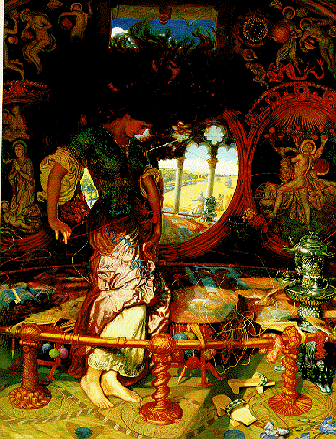Whether or not Alfred Tennyson was the greatest of the Victorian poets, as affirmed by many critics today, there is no doubt that, i.e., he was the most popular of poets. In his own lifetime On the bookshelves of almost every family of readers in England and the United States, from 1850 onward, were the works of a man who had incontestably gained the title that Walt Whitman longed for: “The Poet of the People”( Whitman, in fact, called Tennyson, colorfully, “the Boss”).
Alfred was the fourth son in a family of twelve children, born in Sommersby, England on August 6, 1809, twenty years after the start of the French Revolution and toward the end of the Napoleonic Wars. Being a son of a rural parson, his natural allegiance was to the traditional, conservative gentry whose wealth and the ownership of land determined status. But his situation was complicated because his grandfather had disinherited his unstable father so that his family was deprived of both money and social standing. Tennyson developed a kind of identification with middle-class notions of progressivism, though he did retain sympathy for conservative values rooted in a traditional social order. But as we can discern, his understanding of class structures was born out of a complex personal feeling. Throughout his life, he tried to come to terms with the growing power of the ideology of industrialism.
He eventually, in 1828, became a member of an exclusive group called the Cambridge Apostles, a group that intended to bring about “regeneration” of society, not through political change or revolution, but a transformation of the mind of the people. They felt Poetry was an effective medium to bring this regeneration. Tennyson’s poetry, likewise, can be seen dealing with the reform of the mind; it allowed the mind, in the Victorian age, to break free from the shackles of old habits of thinking and outworn customs and laws. Imaginative freedom and political freedom were made to stand apart.
The Lotus Eaters: Setting
Published in 1832, “The Lotus Eaters” is one of the most admired and widely read poems by Tennyson. The poem takes its inspiration and foundation from Homer’s Odyssey, deriving its context from the story of Odysseus’s mariners described herein. Homer writes about a storm that made the great hero’s mariners deviate from their destination to homes in Ithaca while returning back from Troy. Instead, they land themselves in a place where people are found doing nothing else other than eating lotus, a flower so delicious that, upon tasting it, at once, some of his men fail to recall their purpose and desire to return to Ithaca. Alternatively, they to remain in the Land of the Lotus. As depicted through the episode, Odysseus must draw his men away so that they can undertake their predestined journey. In this poem, Tennyson evokes the mariners’ desire to spend their lives in a sensuous land, to get themselves settled into a life of peacefulness, rest, and even death.
Besides drawing a context from Homer’s Odyssey, the poem also illustrates or rather portrays, through a different episode, the scene of biblical Eden Garden in the Book of Genesis. However, unlike in the Bible, where Adam was punished with a ” life of toil” on tasting the fruit of the Tree of Knowledge, in “Lotus Eaters,” Tennyson portrays a different result; the fruit(the lotus), here, provides a release from the life of labor. He provides a tempting and seductive vision of life that is seen free from all materialistic pleasures and toil, getting themselves subsumed with their instinctual drive. In this sense, the poem has been pointed by critics to be a subversion of the story in the Book of Genesis.
The Lotus Eaters: Poetic Devices
This is a long poem, divided into two parts: the first appears a descriptive narrative, consisting of forty-five lines. The second is a song of eight numbered stanzas- Choric Song; several lines can be seen indented throughout. The first part is written in nine-line Spenserian stanzas, so-called because Spenser used his renowned work “The Faerie Queene,” consisting of eight iambic pentameters and an alexandrine, employing a rhyming scheme of ababbcbcc. The choric song follows a far looser structure: both the line length and the rhyme scheme vary widely among the eight stanzas.
Tennyson employed a wide range of styles and had a deep understanding of meter and rhyme scheme. He employed allusions in different genres and often added motifs, symbols, and images.
Imagery: The very title of the poem employs the image of “lotus,” that which can be read under the figurative use of organic imagery. It is this flower, which on being consumed by the mariners talked about in the poem, draws them away from their destined journey to Ithaca. It leads them into a state of trance or temporal amnesia. The other images seen are “folded leaf” and “a full-juiced apple,” which depicts the natural tendency of a life-birth and death.
Symbol: The “full-faced” of the moon that stands above the valley can be seen as employing two meanings simultaneously: one that it was a full-moon day, and the second implication is that the moon had a more clear-cut identity than the inhabitants of the island, as it was more aware of its basic functions.
The Lotus Eaters: Summary
The poem begins with the Odysseus pointing a finger towards the land that was seemingly the mariners’ destination. This gesture on the part of Odysseus functions not just as a direction for guidance, but also infuses them with optimism regarding reaching their target, from which they have deviated being drawn towards the “land of streams,” which profoundly affected their intellect. The mariners reach a land “in which it seemed always afternoon,” because of its surrounding peaceful and languid atmosphere; no action was seen in this land, that could define time or vice-versa. The lethargic air is seen to draw the individuals here in a state of trance. It seemed as though it was in a weary dream. The mariners are spoken as being greeted by the ” mild-eyed melancholy Lotus-eaters,” whose dark faces appear pale against the rosy sunset. These Lotus-eaters offer the flower and fruit of the lotus to Odysseus’s mariners, who on its consumption loosen their intellectual capacity, and is deviated into a feeling of deep sleep. Sitting upon the yellow sand of the island, they loosen their sense of perseverance, and at the same time, fail to perceive their fellow mariners speaking to them; they can now hear the music of their heartbeat. Instead of continuing their journey towards their home, they prefer to stay in this languid land.
The other part of the poem, Choric Song, is an expression of the mariners’ resolution to stay in this utopian land forever. They praise the sweet and lethargic music of the land, comparing it with that of petals, dew, granite, and tired eyelids. Further, they interrogates as to why man is destined to toil and suffer, unlike everything else in the nature that enjoys the capacity to rest and stay still. Man’s inner spirit answers him with an optimistic approach, saying that it is the tranquility and calmness that offers joy and that man is fated to toil and wander along throughout his lifetime. In the following stanza, there is seen a declaration from the mariners, who speaks about the natural tendency, according to which everything in nature is allowed a lifespan during which it can bloom and fade. To illustrate this point, he gives the example of the “folded leaf,” that turns yellow with time and eventually dies, and that of the “full-juiced apple,” that ultimately drops down to the earth once it ripens.
In the very next lines, the mariners question the very purpose of a life of labor since nothing on this earth continues to live forever without coming to a final end. He asserts that every accomplishment on the part of human beings leads nowhere; nothing remains cumulative. And this is so because death is made to be the final destination. Seeing everything as futile, the mariners desire for a long rest or death because they believe that either of them would free them from a life of endless labor. In the next stanza, however, they are seen to echo back their optimistic appeal to luxurious self-indulgence. They wonder how sweet it would be to life a life of continuous dream, where they could enjoy their sleep, dream, and the lotus fruit without any interruptions made by external pressures. They believe that such an existence could provide them the peaceful capacity to remember their loved ones who no longer exists in their life; this state would bring them closer to their cremated beloveds.
Their inertia to remain in this land strengthens with their view that their returning home would only create confusion in the family; and this is so because they perceive that their family must have forgotten them in these ten years of their absence, being out on a fight in Troy, and sons must have inherited their property. They infer that their return would only create hassle among the peaceful lives of family members. The seventh stanza echoes the first and the fifth, with the mariners speaking in favor of the life among the pleasant sights and sounds of the island. The concluding stanza closes with the mariners’ vow to spend the remaining part of their lives in this “hollow Lotus land.” Their inclination to be close to their natural instincts and enjoy nature wins over the external forces that drive a man away from nature.
The Lotus Eaters: Analysis
“The Lotus Eaters” is an intriguing poem through which Tennyson seems to create an existential awareness. At the same time, the mariners show their attributes towards life; seeing the futility of human struggle, they wish for a life of languor. Heroic achievements, epistemic growth, and intellectual pursuits are reduced to ineffectual, futile things in the course of the poem. Though the choric song reflects such a philosophy, the poet can be understood as making an attempt to echo the opposite through these understatements, especially when he recapitulates the idea of sameness screenching ‘boredom’ and the qualities of a monotonous sterile subsistence.
The Lotus Eaters: Central Idea
By providing a tempting and seductive vision of life from toil, Tennyson in the poem attempts to establish the nature of human life, which is predestined to be spent with labor and pain. Though the mariners, here, crave for a dream-like existence, the poet’s intention could be seen as its opposite, that which can be echoed from his another poem, “Ulysses,” wherein he exerts the real motto with which one could lead a meaningful life: “To strive, to seek, to find, and not to yield.”
The Lotus Eaters: Tone
The poem begins with a sluggish tone since the mariners are seen deviating from their real purpose of returning to their homelands. It ends with a similar tone, with them having an inclination towards a dream-like existence. The natural beauty is appraised from the very beginning till the concluding stanza. Arthur Henry Hallam defines this kind of poetry as “picturesque,” as combining visual impressions in such a way that they create a picture that carries the dominant emotion of the poem.
The mellifluous lyric “The Lotus Eaters” can be seen as an aesthetic verse that portrays the lifespan of a mortal man who has to live his life with labor, pain, and happiness. The poem can even be read as a dramatization of the modern man’s psyche, which tends to incline towards enjoying his life without a purpose. At the same time, it represents the lost fervor towards one’s existence when one attains old age.
Some online learning platforms provide certifications, while others are designed to simply grow your skills in your personal and professional life. Including Masterclass and Coursera, here are our recommendations for the best online learning platforms you can sign up for today.
The 7 Best Online Learning Platforms of 2022
- Best Overall: Coursera
- Best for Niche Topics: Udemy
- Best for Creative Fields: Skillshare
- Best for Celebrity Lessons: MasterClass
- Best for STEM: EdX
- Best for Career Building: Udacity
- Best for Data Learning: Pluralsight














